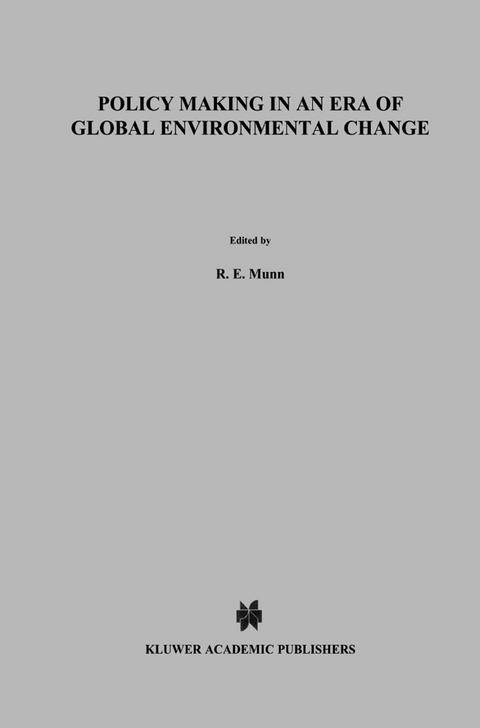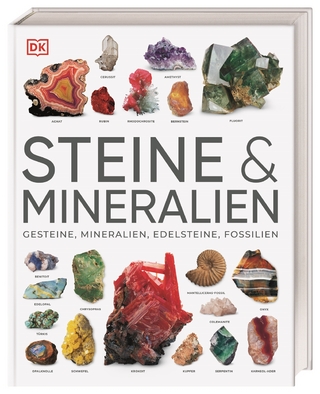
Policy Making in an Era of Global Environmental Change
Springer (Verlag)
978-0-7923-3872-7 (ISBN)
Governments, business and industry have, therefore, come to recognize that scientific knowledge about the changing global environment - as yet incomplete but rapidly evolving - is becoming indispensable for wise long-term policy making, the goal being to design preventive, adaptive and remedial measures.
Thus global change science and policy making are engaged in a process of forming a new partnership that is taking shape as further insights evolve. Effective continuous interactions between the partners requires mutual understanding: decision-makers need to understand the unique potential but also the limitations of the results of scientific research in progress while scientists must take into account the priorities and constraints of policy-makers in designing and implementing policies that will promote long-term sustainability of life on this planet.
This book contributes in a unique manner to this mutual understanding: It gives an overview of the ongoing relevant research focusing on the two major international programmes, the International Geosphere-Biosphere Programme and the World Climate Research Programme. These are described in terms understandable to the interested lay reader. The results of the latest review of the Intergovernmental Panel on Climate Change (IPCC) are included. This is followed by an analysis of the response process that is in progress with respect to governments - singly and multilaterally - by business and industry and by public interest groups. This process is leading to interactive structures, assessment procedures and legislation, nationally and internationally. Business and industry are changing from mere watchfulness to recognition of new opportunities for products and processes. Six interviews with prominent figures from business and government circles in the Netherlands provide a vivid illustration of the questions at issue. The appendices provide overviews of methods for incorporating the results of global change science into policy-making and development of long lasting projects. Adaptation to climate change serves as an example. Thus, for the first time, one book describes both ongoing research work in global change and the response processes that the research results are evoking. It is of interest to all stake-holders in the scientific community as well as to decision-makers in industry, business and government.
1. Global Change: Both a Scientific and a Political Issue.- Introduction: what is global change?.- Examples of some recent ‘global’ trends.- Global change in the 21st century.- What are the consequent critical issues for science and for society?.- 2. The Main International Environmental Research Programmes.- IGBP and WCRP.- Other relevant research programmes.- 3. Understanding the Earth System.- Introduction: cycles and systems.- ‘Nothing is permanent except change’, Heraclitus, c. 500 BC.- Trapped in the ice.- The carbon connection.- Hydrological drivers.- Up in the air.- Bringing it all together.- Epilogue.- 4. Understanding the Climate System.- — the climate system.- The natural greenhouse effect.- Temporal and spatial scales of variability.- History of earth’s climate — natural variability and its impacts.- Human intervention — the enhanced greenhouse effect.- Climate research — international coordination — national efforts.- Prospects for climate prediction.- The IPCC scenarios for future climate.- Potential impacts of global warming.- Climate change research in service to society.- Summary.- 5. Policy Responses to Global Environmental Issues: an Introductory Overview.- New approaches: new partnerships.- Sustainable development.- The Brundtland report.- Economic considerations.- Long-term environmental management.- Involving the public.- 6. Intergovernmental Policy Responses to Global Environmental Issues.- The changing role of science in global policy.- The need for international assessments of global environmental issues.- An example: the climate change issue.- Using scientific information to establish global environmental policy.- Strategies for dealing with global environmental change.- Future prospects.- 7. Examples of GovernmentalResponses.- Range of strategies available to national governments to deal with global change.- Knowledge-building strategies.- Relations between national and international global change research programmes.- Examples of some national and regional global change research programmes.- Capacity-building strategies.- Concluding remarks.- 8. Examples of Responses by Business and Industry.- Introductory remarks.- The business ecosystem.- Earth System research: opportunities for business.- The science/business interface.- Interviews with six senior members of the business and government communities in the Netherlands.- 9. Environmental Non-Governmental Organizations (ENGOs).- Legitimacy of ENGOs; their place in society.- Environmental advocacy.- Relationships between business and ENGOs.- Appendices.- A1. Contact Addresses and Further Information on Authors, Supporting and Sponsoring Organizations.- Addresses of contributors to this monograph.- Addresses of the main bodies active in the field of global environmental change.- Addresses of an international fund for global change research.- Addresses and information on 14 Dutch businesses that assisted financially in the 1992 symposium and the preparation of this book.- A2. List of Acronyms.- A3. Methods for Assessing Effects of Global Change on the Biosphere and Society.- Methods available.- Sectoral impacts of global change.- Integrated assessments.- The use of historical analogues.- The Mackenzie River basin study: an integrated assessment based on scenarios.- Socio-economic impact of sea level rise in the Netherlands.- Applying some modern ideas on ecosystem integrity to global change assessments.- Concluding remarks.- A4. Instruments for Facilitating the Application of Global Change Research Results to Policy-making.- Consensus-building.- Environmental impact assessment (EIA) and cumulative environmental assessment (CEA).- Establishing long-term environmental priorities.- A5. Inventory of Adaptation Strategies Relating to Climate Change: A Canadian Example.
| Reihe/Serie | Environment & Policy ; 6 |
|---|---|
| Zusatzinfo | XVIII, 224 p. |
| Verlagsort | Dordrecht |
| Sprache | englisch |
| Maße | 156 x 234 mm |
| Themenwelt | Sachbuch/Ratgeber ► Natur / Technik ► Natur / Ökologie |
| Naturwissenschaften ► Biologie ► Ökologie / Naturschutz | |
| Naturwissenschaften ► Geowissenschaften ► Geologie | |
| Naturwissenschaften ► Geowissenschaften ► Meteorologie / Klimatologie | |
| Sozialwissenschaften ► Politik / Verwaltung ► Staat / Verwaltung | |
| Technik | |
| ISBN-10 | 0-7923-3872-3 / 0792338723 |
| ISBN-13 | 978-0-7923-3872-7 / 9780792338727 |
| Zustand | Neuware |
| Haben Sie eine Frage zum Produkt? |
aus dem Bereich


